LRSD Battles For Local Control
Little Rock Mayor Frank Scott offers his public comment on the proposed motion to reconstitute the Little Rock School District. “Never before have you seen a city this engaged for its school district. For our city to be the true catalyst of the new South, we have to have educational achievement and diversity in the marketplace,” Scott said.
Little Rock, Arkansas, known for its historic place in the desegregation of American public schools, is once again facing a crisis of educational rights. A decision made by the governor-appointed Arkansas Board of Education threatens students’ rights to an equal education for all. The proposed motion to reconstitute the Little Rock School District into two administrative systems, one for failing schools, which are often impoverished and underfunded, and another for succeeding schools, which are often affluent, jeopardizes the progress made since the Little Rock Nine boldly ascended the steps of Central High in 1957. Reconstitution would recreate in Little Rock the conditions that ruled before 1957, allowing for separate and unequal schools divided legally by race and class.
On October 10, members of the Arkansas State Board of Education met at the state capitol complex to discuss a motion proposed in an earlier meeting by the board that would reconstitute the administration of Little Rock School District into categories of failing and succeeding schools. These changes are based on which schools have received a rating of “F” from the Every Student Succeeds Act (ESSA) School Index created by the Leadership Support Service of the Arkansas Department of Education.
Deputy Commissioner of the Division of Elementary and Secondary Education Deborah Coffman defended the validity of the ESSA scores. “It’s important to note that our… scores were determined by stakeholders. We had six days of meetings with stakeholders… six days of a room full of people… that came in and worked on setting those scores A to F, so I am very confident in those scores.”
The stakeholders who had determined those passing and failing grades for public schools were not identified at the meeting. The meeting room, spartan and brightly lit, was filled to the brim with red-shirted protesters, some of whom were forced to stand in the hallway because of their sheer numbers.
The concerned citizens of Little Rock arrived to oppose the reconstitution of the Little Rock School District. They cited many reasons: reconstitution was a reactionary change, it would have unpredictable results, and, most of all, the division of the school system was seen as a potential tool of segregation to be turned against minorities and those living in poverty. This course of action had no official legal opposition. The state eliminated local opposition by removing the citizen-elected, local Little Rock School Board and giving control of city schools to the governor-appointed Arkansas State Board of Education almost five years ago in an action that sparked controversy across the state.
Diane Curry, a former elected Little Rock School Board member, spoke about her governor-approved removal from her citizen-elected position.
“I was an initial board member for Little Rock,” Curry said. “I was one of the seven board members removed, and we know that… it wasn’t done in the right way, for the best interest of the district. I’m here because I know that, after five years… the status of the district is still not improved. Why would they continue to hold our district hostage? [There are] possibilities of leaving out schools that are rated F–of course, that would be further segregation, which we’ve fought for so many years. I’m for getting our district back to local control.”
The night before, thousands of Little Rock locals swarmed the steps of Central High in a massive protest. They agree with Curry and argue in their protests that a democratically elected local School Board will always have more power to represent the people than a governor-appointed body.
One protester, a concerned adult citizen who did not wish to be identified, criticized the State Board of Education for its lack of clarity.
“They still haven’t given a clear definition of what [the reconstitution] is,” the man said. “We’re saying right now… we want to have our own say by electing our own school district. Turning it back to local control. At the first meeting… they said that they themselves didn’t have a definition for reconstitution. They still don’t have a definition for reconstitution.”
Following a lengthy discussion of business, State Board of Education member Chad Pekron shifted in his seat under the weight of the citizens’ criticism, then proposed that the district be returned to local control, to applause and relief from the crowd.
Before a motion was passed, time was allotted for public comment. The first speaker was Frank Scott, Little Rock’s first elected black mayor, who strode into the room in a tailored blue suit, stirring excited chatter from the audience.
“We stand in unity for full and complete local control [for] every child in every neighborhood, no matter the zip code, in the city of Little Rock… because we believe in each and every child,” Mayor Scott said. “Never before have you seen a city this engaged for its school district. For our city to be the true catalyst of the new South, we have to have educational achievement and diversity in the marketplace. You can’t have diversity… without educational achievement.”
Scott left the podium to thunderous applause. Soon after him came Natalie Willis, who stood with grace at the podium to relate her historical experience as a black woman in Little Rock:
“Let us not repeat history. I was a child in the 50s, and so I lived all of this,” Willis said. She compared the current reconstitution motions to similar measures by Governor Orval Faubus in the 1950s to keep the district segregated and unequal.
Comments ranged from placating to provocative: LRSD Superintendent Mike Poore argued that “we work toward the middle,” while another citizen, Julius Larry, argued that “racial discrimination… against the students… perpetuated by the state itself” would give citizens “no choice but to file a lawsuit against the [Arkansas State] Board [of Education].”
One teacher asked with emotion that the Board not force her to stand between her students and the danger of a damaged, stunted, and segregated education. Her speech moved several in the audience to tears.
Another teacher, Kim Crutchfield, related her own story about the importance of a unified, well-tended school district that respected its teachers. “I had a baby at 13. I did not have the support of my family, but let me tell you who I did have the support of: my teachers. If it wasn’t for Ms. Camara at Mabelvale Junior High, or Ms. Mildred Walker of McClellan High School… [who] made sure I came to school every day… I would not be here,” Crutchfield said.
Each testimony received applause, but only one received a standing ovation: the testimony of Charles Zook, a frequent substitute at Central High. Zook is wheelchair-bound and relies on a service dog, Rufus, who loped alongside him and sat dutifully as Zook spoke at the podium.
“Rufus and I taught Spanish in a portable building at Dunbar Middle School, a low-grade middle school south of 630. Many of the students came from broken homes and extreme poverty. Years later, as an LRSD substitute teacher, I got to watch them grow up. LRSD… had always been a vital source of stability for them. You cannot tell me this district failed those students,” Zook said. “School failure, culturally biased high-stakes testing, and bogus school indexes are used against students like the ones I taught at Dunbar as pretense for systematic, billionaire-backed destruction of public education.”
His speech was interrupted many times by applause, but he continued in a quiet, measured tone, reading carefully from a prepared script. The room became quiet as he reached the climax of his speech: a denouncement of his own family’s motives for supporting the reconstitution.
“My father, Randy Zook, is the CEO of the State Chamber of Commerce, and also sits on the board of the Arkansas Public School Resource Center, a Walton Family Foundation-funded charter school advocate. His wife Diane… is chair of your board,” Zook said. He met the eyes of his step-mother, Diane Zook, with a dignified challenge as he gave his testimony far below her seat. She sat stock-still in a pristine blue suit, listening, her expression still.
Over the course of his speech, he claimed his relatives had tried to silence him–to keep him from protesting the privatization of education in the state.
The comments from the public concluded as the motion was put up to vote–and passed, after a lengthy speech by Diane Zook. Several community members in the front row vocally called out that her speech had little to do with the motion at hand.
Then Pekron spoke once more, more quietly, and asked that a second motion be passed–one that would defer the decision for reconstitution to a different court. The room buzzed with muttered, angry comments from protestors, who felt cheated out of the decision-making process.
One woman called for a new round of public comments based on this proposed motion. Diane Zook told her that “Public comment had already occurred,” spurring two cries of “Not for the new motion!” and “You are lying!” before she slammed her gavel for silence. Pekron soon asked to remove his proposed motion to pass the decision along, watching with a nervous expression as the audience gradually settled down again.
However, the motion that promised to return the district to local control was met with suspicion by many.
While some remain hopeful that substantial change will occur, others fear that the State Board of Education will remain in charge of important decision-making, removing the chance for an equal and proper education for impoverished students in favor of charter and private schools for the Arkansas elite.
“A relative of mine came to me and asked me to stop speaking out on these [issues] because it was ‘embarrassing the family.’” Charles Zook said. “I asked that relative what I should make of [his] blatant conflict of interest, and was told with a smirk, ‘well, that’s just how things work in Arkansas.’”
As in 1957, Little Rock is still Arkansas’s crucible of progress, and decisions made here will, as Mayor Scott stated, have ripple effects across the entire state–and potentially the nation as a whole. Allowing resegregation to overtake Little Rock will have dangerous ramifications for minority and poor students across Arkansas.
In her speech, Crutchfield defined what success meant to her, and what success, in turn, meant for every student in Little Rock.
“Let me tell you what a true success is: [each] kid comes to school every day and tries. It may not always be an A, but… they come to class every day and they try.”




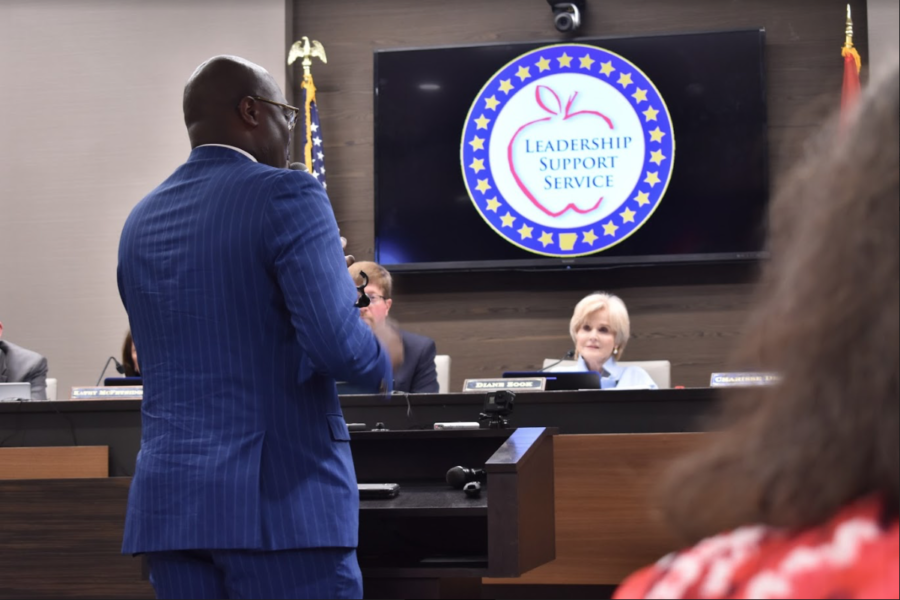
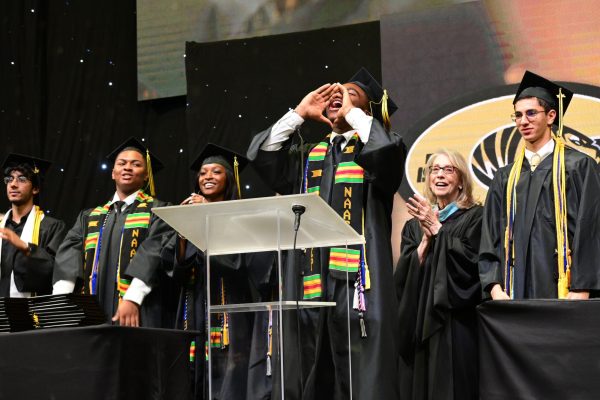
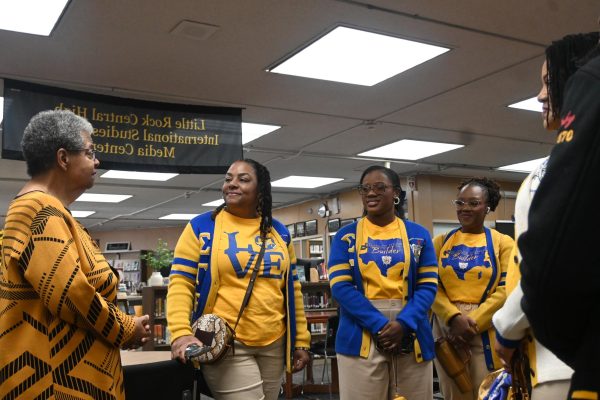


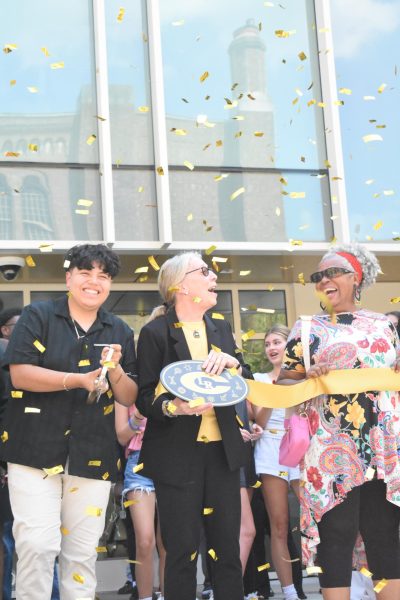
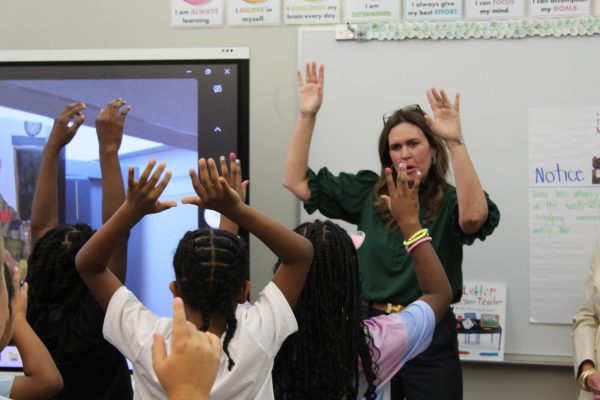
Carol Holiman • Nov 2, 2019 at 1:36 pm
Beautifully written. You are awesome!